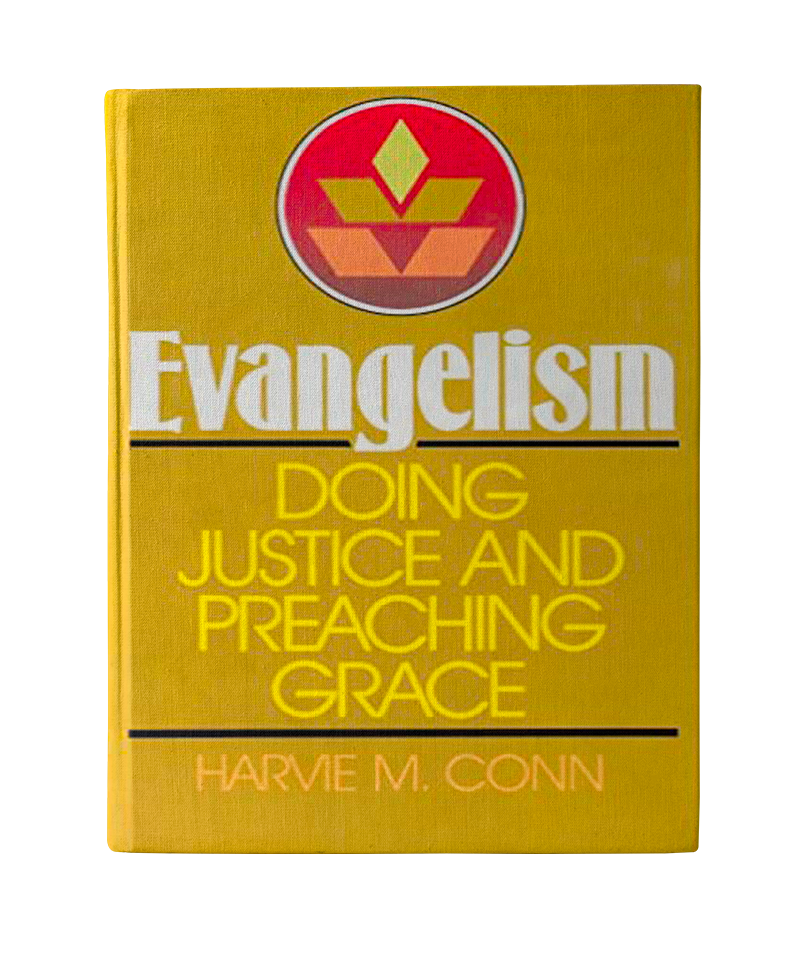Conn, Harvie M. Evangelism: doing justice and preaching grace. Phillipsburg, New Jersey: P&R Publishing, 1982. 112 pp. Paper, ISBN 0-87552-206-8.
Athough this book by the late Harvie Conn is quite old now, it remains one of the best books on evangelism you will ever put your hands on. It is relatively brief but dense and fast moving; biblical but very pithy, and profoundly challenging – especially to the conservative or Reformed evangelical who tends to operate with a truncated theology and an unnecessarily narrow concept of evangelism. Conn’s aim in this publication is to present an accessible exploration of the relationship between evangelism and social action as interdependent components of holistic or Lordship evangelism. His main argument is that evangelism is a matter of gospel “show and tell,” an integration of “verbal witness and exemplary deeds” (p. 73). This is not a “how to” book, but is no less practical for that. Conn wants to “say something positive and as practical as a seminary professor can get” (p. 10). Indeed, although Conn was Professor of Missions at Westminster Theological Seminary when he put this book together, he was no mere theoretician. He had served, for instance, as a missionary in Korea, where, among other things, he did evangelistic work amongst prostitutes, receiving several beatings for his trouble.
In the first chapter Conn focuses on the Pauline principle of being “all things to all people” or, as he says, “a theology of scratching where people itch.” Chapter 2 speaks to the issue of evangelism in terms of the world’s “felt needs” as they connect with the church’s kerygma, diakonia, koinonia and leiturgia. Conn then introduces a fifth term – dikaiōma, the righteous deed – the doing of justice to one’s neighbour, which is simply an outworking of biblical love. In chapter 4, Conn simply but deftly undermines the one-dimensionality of both world-centred and soul-centred spiritualities, and the two-dimensional spirituality that attempts to juggle both evangelism and social action as legitimate but quite distinct concerns. Chapter 5 is a call to prayer as the crossroads of word and deed evangelism – prayer between the “already” and the “not yet” of the kingdom that cries out against the brokenness of the world, demanding that it be changed because Christ has come and will come. In the sixth and final chapter, Conn suggests that a paradigm shift is required to change prevailing church models that actually hinder Christian communities from being the people of God in full-orbed engagement with the world.
Conn manages to cut across the dualisms that characterise much evangelical theology without tearing out the heart of the Gospel. Our greatest problem, he suggests, may be “the minimization of the gospel’s outer limits” (p. 56). Although he cites quotations and examples from a variety of people and places, Conn himself works from within a self-consciously Reformed framework. Occasionally he quarrels with aspects of his own theological tradition but on the whole shows it to be a rich resource for a holistic view of evangelism. Conn is able to work a vivid and punchy turn of phrase without resorting to cheap slogans. His case is not presented so much in a linear and abstract fashion, but through series of questions and claims. His task is not to argue a sophisticated thesis but to break down existing paradigms and allow us to see what is there in Scripture and what can be done in the world. Almost every thought is immediately enfleshed in a contemporary or biblical example. This compelling and convincing little book has increased my dissatisfaction with models of evangelism that I feel almost entrapped by. It is a book to be read again and again, and most assuredly to be put into effect. Although somewhat dated, the content is not tied to passing trends. Local church communities will need to do the homework on their own backyards.
